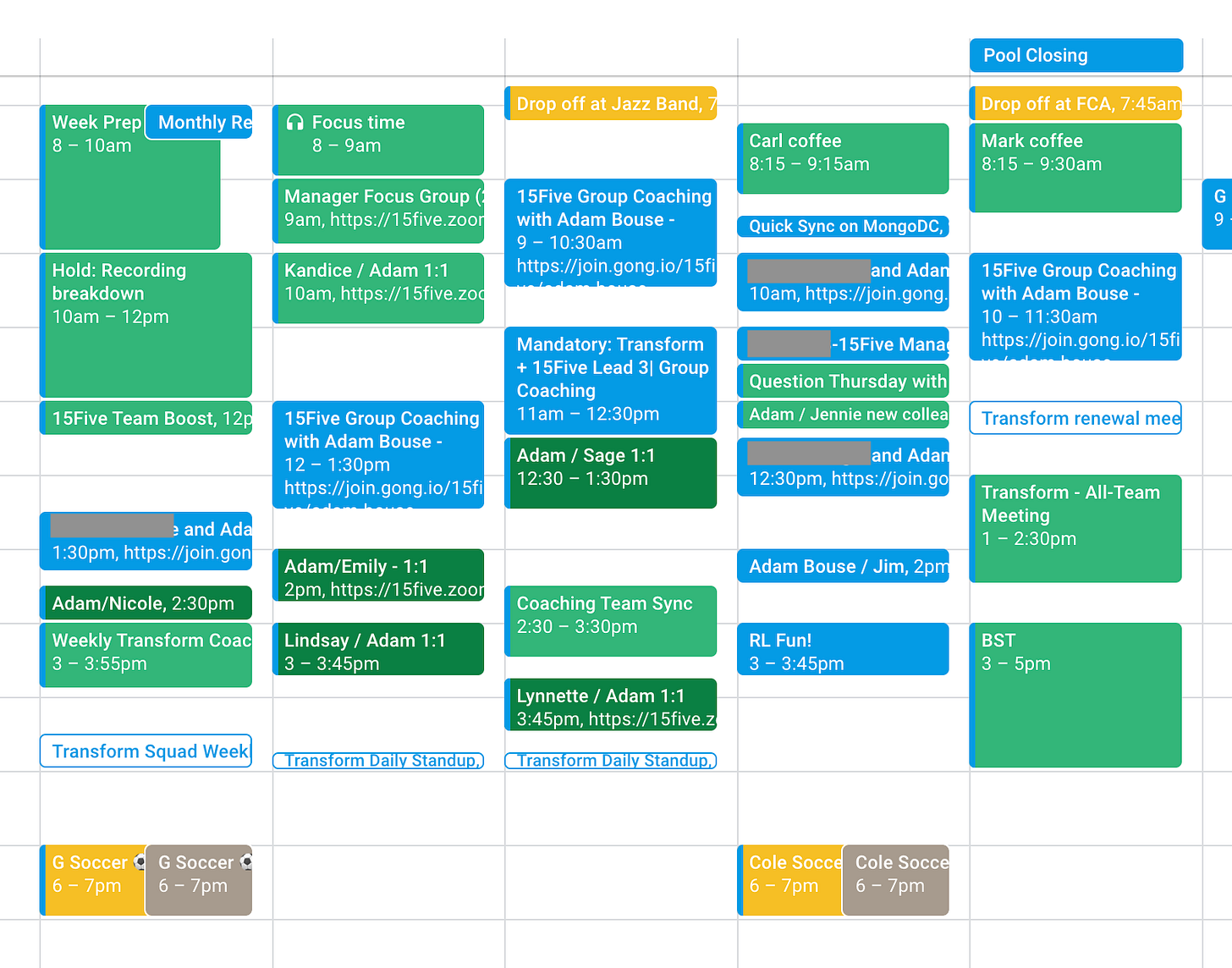It’s been a minute. Welcome back!
Hit reply and let me know what’s new for you - or if anything in today’s dispatch sparks a thought or question.
I’ve been thinking about time lately.
I recently realized how full my calendar is most weeks, something a previous version of me would have been repulsed by. Here is a view at a recent week, one that feels representative of the last several months:
Perhaps it’s a sign of acceptance that the fullness hasn’t stressed me out. Or maybe it’s having a clear(er) purpose and alignment to what is motivating: I love the work I’m doing as a manager and coach, motivated by the mission of our company and the opportunity to help people grow and thrive.
At the same time, the last few weeks have found me physically tired and feeling like my batteries need to be recharged. Nothing bad, nothing dramatic—just a sense that I need to be refreshed.
So I looked at some of the data my activity tracker produces:

Even though I love my work, love the people I’m working with, enjoy watching my kids play sports, enjoy (mostly) the work involved in training our new dog, and the beginning of fall is absolutely one of my favorite times of the year, sustaining the cadence I’ve been moving at isn’t sustainable for me, not yet.
“Revenge sleep procrastination” is a phrase I heard several months ago. Sometimes referred to as “revenge bedtime procrastination,” I needed little explanation about what it was and why people would do it.
The idea of sleep procrastination isn't new to researchers, but the revenge spin is. It reportedly comes from the Chinese expression “bàofùxìng áoyè,” which took off on social media and roughly translates to “revenge bedtime procrastination” or “retaliatory staying up late.” #
Here is the tweet that made the term go viral and mainstream two years ago:

In thinking about my own life right now, I realize that I’ve been doing this — spending more time on screens, scrolling, clicking, and consuming late in the evening as a way to recoup some of the “free time” and casual learning I use to be able to weave throughout my average day. That margin just doesn’t exist in the same way it did a few months ago—and so I’ve been getting “revenge” (a bit of a strong term) by taking back control on my evenings and indulging in what I passively think is refreshing, but really is kind of mindless and mind-numbing. It’s impacting my sleep, which impacts my energy, which impacts how I show up at work, for my family, and for myself.
I also had a profound moment of self-awareness as I was discussing the practice of digital detoxing with a co-worker. I pulled up my phone usage stats to see how much I have been using my phone and how often I open up certain apps. I was aghast!
Like any self-respecting addict, I think I have better boundaries and self-control than I actually do.

I’ve made some changes on my phone - moving apps, deleting apps, turning off notifications, etc. There is more work to be done here! But it was a real eye-opening moment, not just about my smartphone habits but also that there was an invitation to consider the underlying emotional motivations that have created these habits.
With all of this, here are a few reminders for myself, and perhaps you, too:
We all have a finite capacity to do more. We can grow that capacity, but we all have limits. No one can go on doing forever without having time to rest, recover, and simply “be.”
It’s hard to overcome bad sleep. You can do so many other things well — nutrition, drinking water, meditation, relational time, physical activity, etc. But if you’re cutting corners on sleep or have poor sleep hygiene, all of that good can get canceled out.
Rest and restoration ≠ vegging out. Netflix time isn’t inherently bad, but it isn’t inherently restorative either. I doubt Twitter is ever restorative, nor Facebook, TikTok, or IG. When you think about your daily routines, what gives you a break and allows your mind and body time to gear down?
Time is a precious resource. As Annie Dillard says, “how you spend your days is, of course, how you spend your life.” Are you investing it in things that you actually want to see grow? Are you committed to investing time in your own well-being and enjoyment? What would an audit of your time say are your actual values and priorities?
….there was an invitation to consider the
underlying emotional motivations that have created these habits.
Links to Check Out
Improve your cognitive performance by ditching your device. “67% of men and 25% of women chose to inflict themselves with pain rather than contemplate their thoughts for 15-minutes.” 😳
Radiolab episode on time. “…we try our hand at unlocking the mysteries of time. We stretch and bend it, wrestle with its subjective nature, and wrap our minds around strategies to standardize it.” ⏳
A Ukrainian and a Russian Are Currently Running 3,100 Miles Around a New York City Block for Peace. “We cannot say that peace is when one guy is superior to another. We cannot say peace is superiority; that’s peace only for those who are on the top.” 🙏
Follow your passion—but only if it’s the right type. “When it comes to passion, psychologists differentiate between harmonious passion and obsessive passion.” ❤️🔥
For the Road
A playlist of songs with the word “time” in the title.







